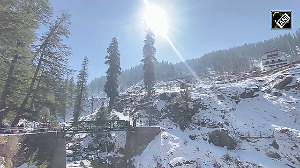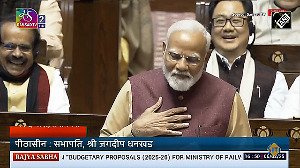At many of the sessions on China, a graphic display greeted participants. The display captured the exports of the US, China and India to the rest of the world. It showed that while exports from China and India were almost the same in the mid-1980's, China surged ahead by leaps and bounds in subsequent years, leaving India far behind.
The US of course, topped the league all along. Even Federal Chancellor of Germany, Angela Merkel, mentioned only China while talking about how Asian economies were growing rapidly.
The final blow for India came from WEF executive chairman Klaus Schwab when he introduced Pakistan President Pervez Musharraf to the audience. "Pakistan's economy has recorded the second highest growth in Asia, after China," Schwab said. Pakistan clocked an 8.4 per cent growth rate last year.
Outsourcing fears
Fears over outsourcing of jobs which intensified a few years ago seem to have subsided. But has it really? At a session on jobs of the future, David Arkless, executive board member of the US-based Manpower, asked: "Can we please stop being insecure about offshoring?"
Explaining, he said the absolute numbers of outsourced jobs were tiny. What developed countries instead should worry about was the future shortage of vocational skills. Electricians, plumbers, infrastructure workers and factory workers would be needed in large numbers and developed countries should focus on vocational degrees instead of academic qualifications.
Columbia University professor Jagdish Bhagwati added another dimension to the debate by arguing that many jobs went to India and Australia mainly because they worked while others slept.
One fond hope expressed by a participant was that healthcare jobs would not be outsourced because this required face-to-face contact. The Indian healthcare industry would like to think otherwise.
Power of the media
Davos had some news for the media barons as well. A session on the future of news concluded that even though blogging was free, it would not pose a big threat to old media-based news organisations.
They would be saved by consumer wariness of the explosion of content on blogs, brand recognition of old media sources and the trust given to professional journalists. Several participants expressed concern over the future of publicly-held news companies.
If news organisations did not multiply revenue streams and increase margins, the market would deal with them without mercy, irrespective of the quality of their content, one participant said. This view was naturally contested and the argument was that quality reporting could and would always make money.
All that NGO business
For those in India, who have little faith in the way NGOs function, the Davos meeting offered a fresh perspective. At a session on building trust in public and private institutions, it was pointed out that opinion leaders all over the world trusted NGOs more than business houses, the media and the governments for information.
This was endorsed by Guy Ryder, general secretary of the International Confederation of Free Trade Unions. "NGOs seem 'more like me' and convey things that matter to me. The fall of confidence in public institutions is most alarming," he said. Amnesty International General Secretary Irene Khan admitted that the factors that made NGOs trustworthy also made them the most vulnerable.
Mush goes mushy
In a tone reminiscent of the days when India used to boast about the commitments obtained from the long-dismantled Aid India Consortium, Pakistan President Pervez Musharraf announced to the world business leaders that he managed to get $6 billion in aid from the global community even though the total damages caused by the earthquake in his country last year were estimated at $5.2 billion. One could not miss the sense of gratitude and achievement visible on his face.
The fairly routine prescription for calamity management from Musharraf, however, drew a long round of applause from business leaders present.
Later in a chat with journalists, Musharraf reiterated his stand on formulating an out-of-the-box approach to resolve the Kashmir issue with India. And this after a qualifying statement that he did not wish to join issue with India through the media.






 © 2025
© 2025